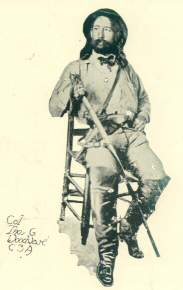


Civil War Memories



The Surrender of Jefferson Davis
as remembered by H.C. Schuelter, of Hazel Green, Wisc.
Associated Press May 26, 1929.
The little man stands as stone. The swamp drips silent for a moment. Then a woman spreads the tent flaps, lifts the man's arms above his head, and says, in a cool, gentle voice:
"Don't shoot, gentlemen. He is unarmed."
She was his wife, faithful in his darkest moment.
Thus was Jefferson Davis, the President of the Confederate States of America captured, May 10, 1864.
The old man who remembers is H. C. Schuelter, of Hazel Green, one of the five Union cavalrymen who rode down the hollow. They had gone with Sherman "to the sea" and were detailed under Colonel Hamden, of the Wisconsin cavalry, to search for Davis, fleeing from Richmond to the Army of the West.
Davis's immobility changed, Schuelter remembers, when they reached the Union camp, and he exhibited his anger and chagrin. This turned to nervousness when soldiers started to chant:
"We'll hang Jeff Davis to a sour apple tree."
His capture was marred, according to Schuelter, by tactics of a Michigan detachment. Unauthorized, it had set out to seek Davis for the $100,000 reward Congress offered. The Michigan troops, says Schuelter, fired into the Wisconsin group, wounding 4 or 5, to give the impression they believed them Confederates and to permit Michigan to claim the capture. But Davis didn't "hang to a sour apple tree," or any other. He never begged for pardon, but asked only for fair trial. After a year in prison amnesty was granted. Later he publicly reaffirmed his states' rights doctrines. For years he headed a Southern insurance company. He died near New Orleans in 1889 and was buried with great ceremony. Later his body was taken to Richmond, Va., for burial.
Mr. Ben D. Moore 

Christian County, Ky.
Oct 28, 1864
Drummondville, Canada West.Dear Sir:
Your favor of the 14th came to hand in due time. Much obliged to you for the manifestations of friendship towards us and that you have not forgotten old friends. I am glad to hear that you are well, though sorry to learn of your hard life.I attended to your business as you requested, as soon as you left. The condition of our country is about as when you left, with the exception of a negro raid, which came out from Clarksville. they took all the men they could find. They got Louis and Reuben from me; Matt got out of the way. Got all your father's except Daniel and Scip, and those two boys. All of Bill Hopkins' men, Isaac and Pleasant Garrott's, Parson Vaughan's and many others, including Isaac from Mr. Radford's. Your father's Millie and Mariah have left since to follow their husbands. They got about 75 men. There has been a constant move ever since. There are from three to four wagon loads passing every day. Some people are driving theirs off.
As relates to our crops. We had a severe frost the 15th of October, which caused me to lose about one-third of my tobacco crop, having no help but Matt. If I could have kept the other two, I would not have lost any. Your father lost a good deal.
The draft is over in this county. All the young men from the Southern portion of the county were drafted, you among others. We have gotten credit for the negroes, which exempts all the white men and 300 over. It is the opinion of good men that there will be negroes enough to fill the calls without any further drafts in this county, as the negroes are all determined to go.
Some persons supposed to be robbers came to George Wills'house in the night and demanded the doors to be opened. He refused to do it. They pressed hard to have it opened. He told them to wait until he put his clothes on. Upon that, they commenced firing at the house and set fire to his porch. He ran out to put it out. They shot him and fled. He was dead in an instant.
Married ont he 13th inst. by the Rev. E. V. Baughan, Ben Bacon to Gabe Donaldson.
The rebel Colonel Lyon, part of Forrest's command, came to Hopkinsville and made an attack on the town; one killed on each side, several Federals wounded. He captured some prisoners, about 60 horses and one ambulance and left for Eddyville. There he took the garrison, which consisted of one company of whites, some negro recruiting officers, 20 or 30 negroes, all wagons and teams and left, taking his prisoners with him.
He took a tour round some of the back counties, went out by way of the station carrying about 100 new recruits and 1,000 horses.
Young Brewer,who was a Southern soldier and a man by tne name of Bradley were captured by Federals at Hopkinsville. Col. Sam Johnson had them both shot. We have a negro recruiting office in Hopkinsville.
Last news from the South: Hood had fallen in Sherman's rear, taking Dalton, capturing 2,000 negro soldiers. Wheeler has taken Rome with about 3,000. Forest, Newport with 2,000.
I believe I have given you all the news that I am in possession of. The negroes, headed by whites, have been to father's and the neighbors round, robbing them of everything they have to live on.
Dr. Drane fire on them, captured one gun, knocked one negro's jawbone out.
Refugges from East Tennessee are crowding in at Clarksville, so they have to shove the negoes out to make room for them.
With best wishes for your welfare
Yours friend,
C. O'Neal


The Death of Colonel Thomas Woodward
Colonel Thomas G. Woodward had been under discipline and deprived of his command and returning to the county, collected a few followers and announced that he was going to take Hopkinsville, held at the time by a small detachment of Federal troops and an organization of homd guards, one of whom was a policeman named Paul Fuller. He came in from the South and at the corner of main and Fifteenth Streets the small number of men with him halted and refused to follow him. One man rode with Woodward, who was under the influence of liquor, and endeavored to dissuade him from the foolhardy undertaking, as the windows along Main Street were filled with armed men. This man finally stopped and Woodward rode slowly down the street to within a few paces of Ninth Street, when he was commanded to halt. He stopped his horse and was in the act of raising his pistol to a window occupied by Peyton Breathitt, where the First National Bank now is, when a volley was fired at him from the windows of the building on that corner and from the upper windows of the Phoenix Hotel, and other nearby buildings. One bullet struck his horse in the neck and four entered the body of the ridere. The horse sank to the ground and Woodward was picked up and carried into the office of the hotel where he expired within a few minutes. The soldier who had been with hime scaped out Main Street and from the hill at Fifteenth, the Confederates fired a volley down Main Street and disappeared. A small sugar tree in front of Dr. W. H. Hopson's residence, at Eleventh and Main, had just been planted and a bullet cut out the top of this little tree. The tree was still living until forty years later, when it obstructed the street and was cut down. Woodward was shot by two rifle balls and two musket balls. Paul Fuller claimed the credit of killing him, and the home guards died not dispute his claim. It was pretty well known, however, from the guns used, who fired some of the shots that took effect. A few years later, Fuller became involved in a shooting affray almost on the spot where Woodward fell and was himself shot to death.
Meacham Chistian County History Page 131

©COPYRIGHT No part of this web sight may be reproduced in any form without written permission from it's submitter, owner, publisher and moderator. All rights reserved. ©1996-2004